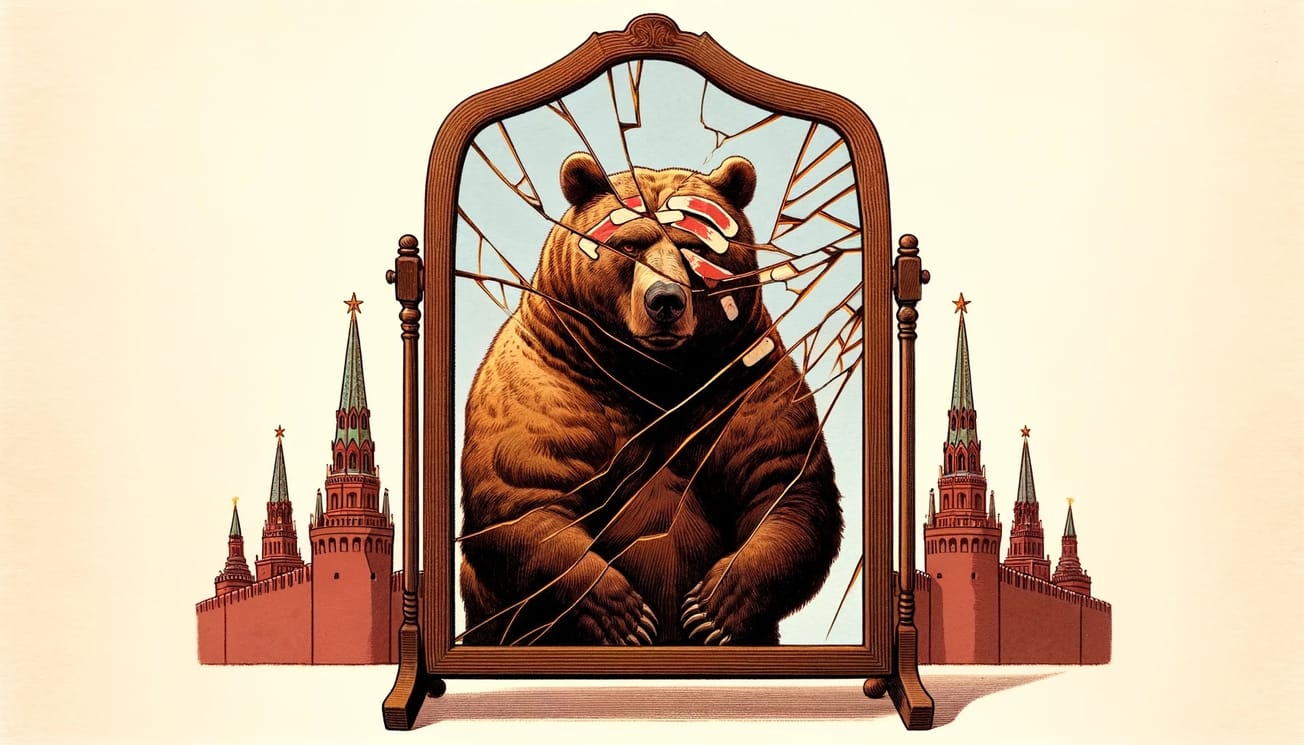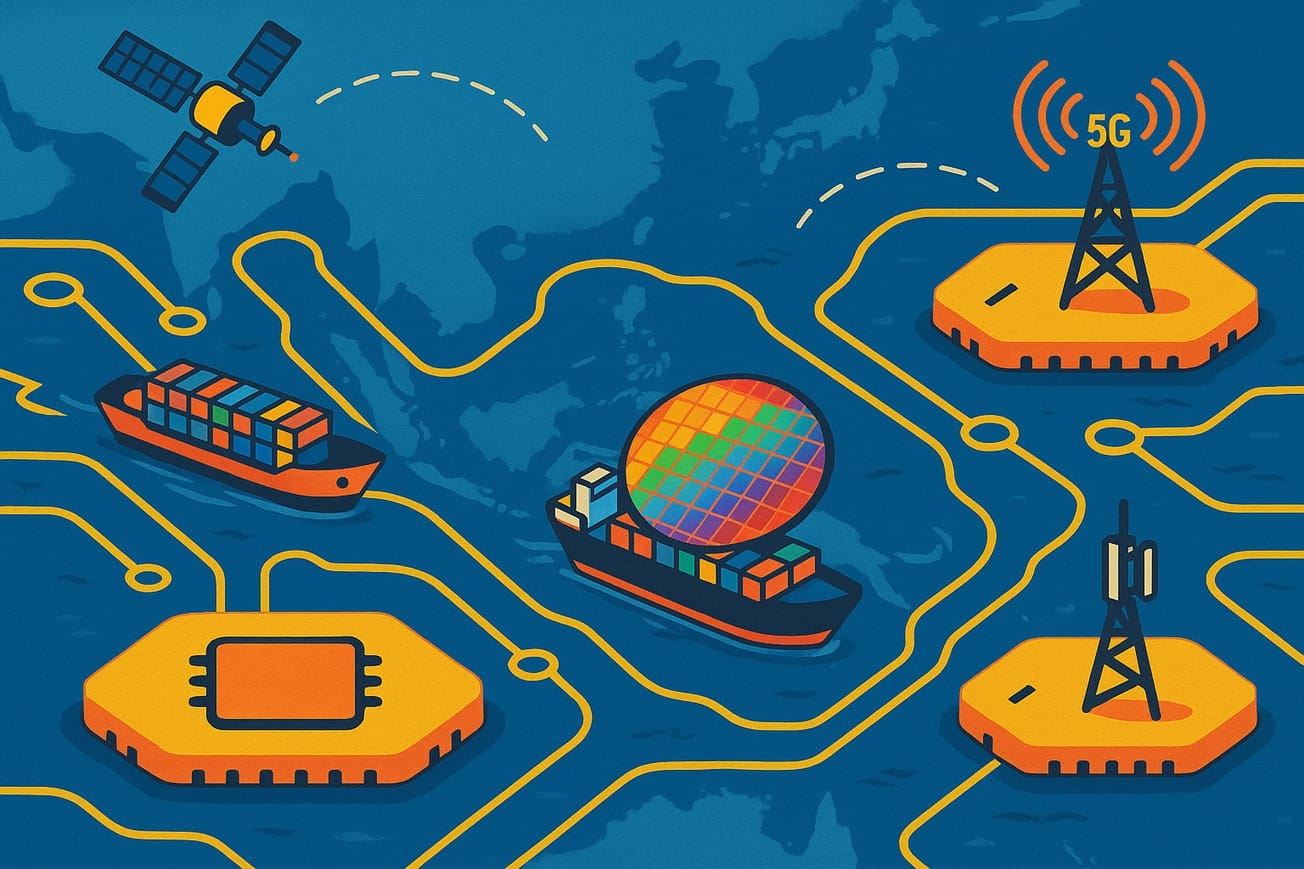

“The greatest trick the Devil ever pulled was convincing the world he didn’t exist”
—Charles Baudelaire
“The second greatest trick the Devil ever pulled was convincing the world he is the good guy”
—Ken Ammi
Part I: Origins
It would be impossible to chronicle Russia’s current use of disinformation and propaganda without first mentioning the country’s beloved tendency toward historical revisionism, particularly regarding the Soviet Union’s perceived greatness and its contribution to the Allied victory in World War II. Conveniently overlooked in this narrative are inconvenient truths like the Molotov-Ribbentrop pact and letters between Stalin and Hitler that “underscore[d] Soviet territorial appetites.” For Russia, the truth is malleable, shaped to suit its narrative. Putin does everything in his power to portray the country as a paragon of strength and morality, an elite military power with a rich history of success, yet also a nation known for its benevolence and generosity.
In the public sphere, Putin's strategy hinges on this manipulation of historical narratives to shape future actions. This is executed through a combination of well-trained intelligence operatives, patriotic sympathizers, a professional diplomatic corps, and an extensive cyber reach operating with virtually limitless resources, legal impunity, and complete domestic secrecy.
Echoing Charles Baudelaire’s sentiment from 1869, Russia follows a cyclical political pattern with its foreign partners: initially courting allies and expressing genuine interest in collaborative efforts with foreign leaders for a mutually beneficial future, only to resort to coercive tactics when its desired level of power or influence is not attained. This coercion often takes the form of strong-arming weaker allies to maintain a façade of unity and political correctness aligned with Russian values. For those uninterested in political submission, slurs like "Nazis" and "fascists" are wielded to justify criticism and aggression toward countries and leaders diverging from Russian rhetoric, only to then blame them and their desire for political distance for the decay of diplomatic relations.
Part II: The Art of Seduction
Soviet propaganda adhered strictly to the script of communism and Stalinism, characterized by censorship and a carefully controlled narrative. In this regard, Soviet propaganda was as reliable for its deceptiveness as for its consistency and inflexibility. Russia’s current propaganda has evolved to become more omnivorous in this regard—far less bound by ideology and more focused on quantity over consistency. Beyond the single rule of never criticizing Putin or the military, this newer, looser structure allows tales of victimization or superiority to be concocted from an arsenal of narratives, depending on which benefits the country more.
Several of these narratives appear frequently in Russian media and journalism. For instance, Putin has deemed Western countries’ acceptance of LGBTQ communities as "satanism," appealing heavily to far-right and conservative voters. Another common narrative portrays NATO’s expansion (and voluntary participation) as neocolonialist and akin to continuous aggression which Russia must valiantly resist. Yet another narrative, combining the previous two, has been used by Moscow to justify the illegal invasion of Ukraine: Russia must protect its culture and population’s 'traditional values' from the debauchery and moral depravity of the West, and Ukraine, as an alleged extension of the motherland, must be defended from the wicked influence of the U.S. and NATO.
To make the propaganda more palatable, anti-Western material is framed to seem like it originates from ‘the people’ themselves, leading them to believe these thoughts and beliefs are their own and spread them willingly.
And the delusional nature of these narratives does little to stop their spread to global audiences. To make the propaganda more palatable, anti-Western material is framed to seem like it originates from ‘the people’ themselves, leading them to believe these thoughts and beliefs are their own and spread them willingly. A global network of pro-Russian sympathizers, bots, and state-sponsored propaganda outlets blitz the disinformation—usually riddled with grammar mistakes typical of auto-translated Russian—across as many platforms as possible. At its most basic level, the strategy is to inundate, overwhelm, and offer either a solution or a culprit for the world’s woes.
Part III: Stirring the Pot: Politics and Businesses
Perhaps the average person believes themselves immune to what should be very obvious lies. However, there is no denying that these falsehoods have percolated into mainstream media. Now, platforms with substantial followings and well-known journalists like Joe Oltmann, Jackson Hinkle, and Tucker Carlson parrot Russian views, usually under the smokescreen of criticizing current Western leadership. In the U.S., President Biden is being pilloried for American aid to Israel and Ukraine, the cessation of which would greatly benefit Russia. Elon Musk has blamed the Ukrainians for continuing their fight to remain independent, citing Putin’s determination as a key reason for them to give up. Likewise, many have voiced support for the U.S. leaving or severely limiting NATO funding under another Trump presidency—a prospect likely leaving Putin salivating onto his meeting table. At Trump’s behest, far-right politicians have begun to question their duty to defend democracy, morbidly vacillating on whether to provide additional support to Ukraine or let them suffer. In this vacuum of weak-willed indecision, there is an astonishing failure to mention the extensive damage--and the net benefit to Russia--that the U.S.’ global image will endure if it fails to uphold state sovereignty and democracy, not to mention the ethical failure of abandoning an ally in their time of need.
Across the Atlantic, politicians and their followers in the Netherlands and France, among others, have echoed Kremlin-colored rhetoric, claiming that Ukrainian migrants fleeing the war are merely freeloaders looking to leech off of more developed nations. The Kremlin narrative usually incorporates bombastic claims about how tightening sanctions against it hurts the EU far more than it does Russia. Africa has been the latest recipient of Moscow’s attention, quickly accepting Russian (and Chinese) aid over that of Western nations, perhaps spurred by the brutal legacy of colonialism and modern paternalistic attitudes toward the continent. In typical opportunist fashion, Moscow has moved to fill the resource gap, providing both economic assistance and sympathetic support for flaring anti-Western sentiments in exchange for natural resources like gold and minerals, and of course, a military presence. In bitter irony, this mirrors the colonial exploitation Africa endured in the past.
Always looking to extend their sphere of influence, Russian disinformation has also trickled into international business sectors, particularly those that pose a threat to Putin’s economic interests. Russia’s economic lifeline rests in its petroleum and natural gas exports, assets they have no issue resorting to violence to preserve. Multiple businesses in the energy, transportation, cybersecurity, tech, and weapons manufacturing sectors that have been deemed potential threats or competitors have found themselves temporarily paralyzed by Russian interference. For companies that are geographically out of reach, the battlefield turns to cyberspace, where the weapons mainly take the form of hacking, network shutdowns, and falsified media coverage. These attacks range from minor inconveniences to temporarily crippling entire regions, but the goal always remains the same: to advance Russian interests.
Always looking to extend their sphere of influence, Russian disinformation has also trickled into international business sectors, particularly those that pose a threat to Putin’s economic interests.
Ultimately, it is private and public institutions that find themselves looking for the anti-venom to their Russian snakebite. Some have been humiliated by the need to succumb to extortion. Others suffer the corporate embarrassment of having their secrets leaked. And there are those who face repeated attacks until they have the resources to defend against them. It is no secret that companies heavily invest in their cyber-defense infrastructure, but more often than not, their defenses are tested—and broken—by these sporadic attacks, pushing many to spend millions of dollars only to land back at square one.
Part IV: Cleaning up the Mess
The onus to debunk every lie, twisted history lesson, and sanctimonious claim falls on a coalition of NGOs, think tanks, security agencies, and technology companies, all of whom have had varying levels of success on the digital front. In 2021, the U.S. Department of Defense announced a contract of almost $1 billion to combat various misinformation campaigns, yet three years on, the results have yet to be seen. Numerous think tanks have devoted themselves to exposing and countering every lie that comes from Moscow with the full truth, however their reach is only as wide as the people willing to listen. Meta, who has been a victim of several high-profile Russian cyberattacks, promotes its use of AI to detect harmful content, though it has consistently been criticized for the ability of disinformation to bypass these supposedly high-tech detectors. Germany, Zimbabwe, and Tunisia have all introduced laws aimed at preventing the spread of disinformation, yet there is no formal summary on their efficacy.
So, has Russia won? The short answer is no. While some countries may be struggling to successfully battle a continuous onslaught of deception, several others have provided helpful insights with proven track records of success. Thousands of Lithuanian volunteers known as “elves” coordinate with one another to identify and remove Russian propaganda and disinformation before it has a chance to influence larger audiences. Their commitment to transparency was instrumental in removing false statements and messaging regarding the 2020 COVID-19 outbreak and vaccine roll-outs, along with the 2022 invasion of Ukraine. The Czech Republic’s Center Against Terrorism and Hybrid Threats (CTHT) works around the clock to identify, analyze, dispel, and draft proposals against any disinformation it encounters, naming and shaming perpetrators to eliminate any ambiguity about who is responsible. Estonia’s Kaitseliit, or Defense League, incorporates physical and cyber defense with public information campaigns, crippling the ability of disinformation to gain traction among a resilient and digitally informed society. Recognizing the need for joint cooperation, the Estonian Defense League has also held cyberattack simulations with various organizations across Europe, using their experience with Russian information warfare to better equip those only now becoming familiar with it.
It is unlikely that Russia will stop anytime soon. Over the past few decades, it has proven incapable of gaining any legitimate influence and has chosen to pour its resources into surreptitious information operations in a humiliating attempt to cling to a perceived power status. While they can claim small victories through the instability and unease their lies have caused, the signs of losing the larger war are too obvious to ignore. Two years on, the world still stands behind Ukraine. Putin is a pariah among all democratic world leaders. Every day, hundreds of thousands commit to exposing Russia’s fabricated narratives, and global institutions work to prevent new lies from entering the public sphere. Though Russia will eventually lose this battle, its waning power does not diminish the danger it poses to governments, businesses, and societies around the globe.






